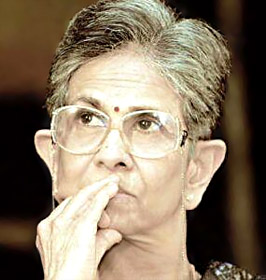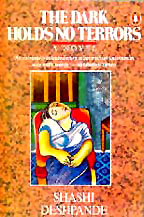 `The Dark Holds No Terrors` is a masterpiece by Shashi Deshpande. The central character of the story wanted to come out of the patriarchical society. The darkness, the nothingness, the blackness therefore is no more a terror to the protagonist as she tries desperately to find herself.
`The Dark Holds No Terrors` is a masterpiece by Shashi Deshpande. The central character of the story wanted to come out of the patriarchical society. The darkness, the nothingness, the blackness therefore is no more a terror to the protagonist as she tries desperately to find herself.
Born in 1938 Shashi Deshpande was a prolific writer. She was the second daughter of a famous dramatist and writer, Shriranga. He was a Sanskrit scholar at his age. She was born in Dharwad in Karnataka and got her primary education in Dharwad, Bombay and Bangalore. She received an English education at a protestant mission school in Karnataka. As a schoolgirl, she read the great British classical novels in English, and particularly liked the work of Jane Austen. She studied Economics in Bombay and graduated in Law from Bangalore with a gold medal. She later received an MA in English Literature. After marriage she did a course on journalism at the Bharatiya Vidya Bhavan, Mumbai. She also worked for a couple of months as a journalist for the magazine `Onlooker`. She started writing at that time, publishing her first short story in 1970. Many of her stories got published in some magazines like `Femina`, `Eve`s Weekly`, etc. `Legacy` the first collection of her short stories came out in 1978, and in 1980 her first novel, `The Dark Holds No Terrors` was published. Her latest novel, `A Matter of Time` was published by The Feminist Press of New York in June 1999. This was her first work to be published in USA. She is a winner of the Sahitaya Akademi Award and also the Nanjangud Thirumalamba award. Her short stories have been widely composed. Presently Shashi lives in Bangalore with her pathologist husband.
Synopsis:
`The Dark Holds No Terrors` is a story of a girl finding her inner self. Long time back, Sarita still remembers her mother`s bitter words uttered when as a little girl she was unable to save her younger brother from drowning. Now, her mother is dead and Sarita returns to the family home, seemingly to take care of her father. But as a matter of fact she wants to escape the nightmarish brutality her husband imposes on her every night. In the lull of her old father`s company, Sarita wants to forget all her grief. Sarita reflects on the events of her life, which includes her small town childhood, her tyrannizing mother, her marriage to the charismatic young poet Manohar, her children, etc. She explains how her husband turns cruel when he realizes his career is going nowhere and that his wife has overtaken him professionally. In his case a sort of male chauvinism worked out. As she struggles with her emotions and anxieties, Sarita gradually realizes that there is more to life than dependency on marriage, parents and other such institutions. And subsequently she resolves to use her newfound truths to make a better life for herself.
 The penguin books, India publishes `The Dark Holds No Terrors` in the year of 2003.
The penguin books, India publishes `The Dark Holds No Terrors` in the year of 2003.
`The Dark Holds No Terrors` by Shashi Deshpande is a tremendously powerful portrayal of one woman`s fight to survive in a world that offers no easy outs. The story line is mainly on the waking up to the releasing knowledge that there is more to life than dependency on husband or parents and social acceptance. The woman is self sufficient in all aspects and in this story the protagonist in on the process of searching that.













